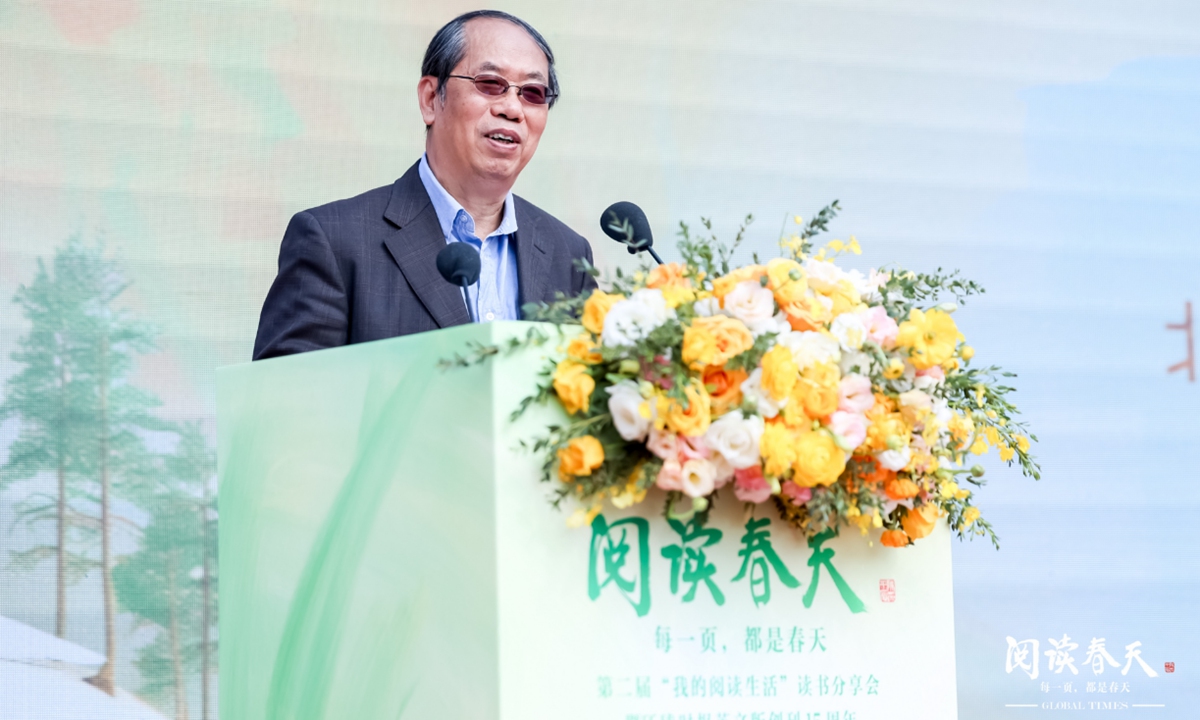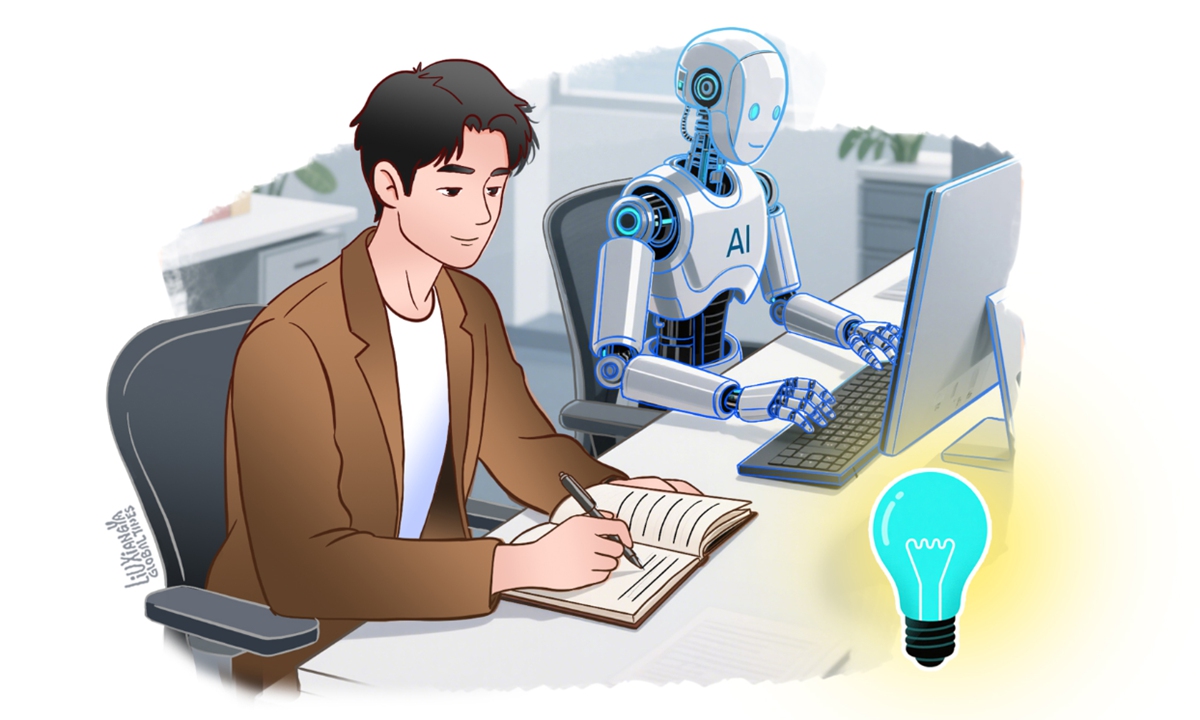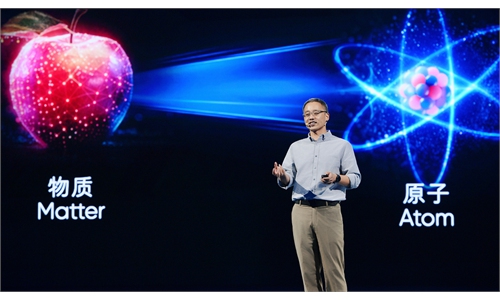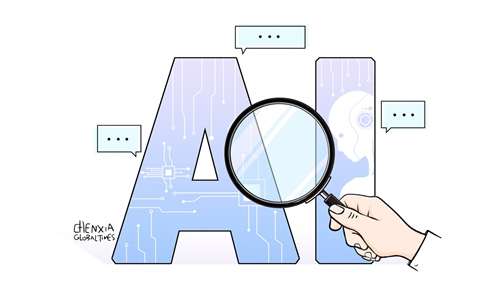ARTS / CULTURE & LEISURE
How humanities scholars can dance with AI
Editor's Note:
From the emergence of ChatGPT to the global shock caused by DeepSeek, artificial intelligence (AI) has evolved from a highly specialized field into a popular topic of discussion. From governments to academia and the general public, AI is profoundly influencing all sectors of society, regardless of individual perspectives or positions. Chen Pingyuan, a professor in the Department of Chinese Language and Literature at Peking University, has been reflecting on the impact of AI on literary education and explores how scholars of the humanities can adapt to this new era. He has set a personal goal: to contribute actively to the monumental task of "rebuilding the dignity of the humanities."

Over the past few months, with the sudden emergence of DeepSeek, it seems that we have entered a new era. The question of how to "dance with AI" has become a nationwide topic. From government officials to everyday citizens, people of all ages and professions have joined the conversation, expressing both praise and criticism. The atmosphere feels almost like, "If you don't talk about AI, all your studying is in vain."
I, too, have followed the trend and read various discussions about AI, covering topics like humanity's future, social equity, literary creation, and educational methods. These discussions have been highly thought-provoking. However, I have decided to focus on a topic that is both relevant and within my grasp: the challenges and responses the humanities academic subjects face in the age of AI.
Rather than engaging in broad, ungrounded debates, I prefer to tackle a few pressing issues head-on. Even if these issues remain unresolved for now, they may serve as guideposts for future generations. For instance, I would like to communicate to AI experts the confusion and challenges that rapid AI development brings to us; offer insights into the strengths and limitations of current AI technology from the perspective of a humanities scholar; and discuss what kinds of AI tools might better meet the needs of the humanities. Most importantly, I want to explore how we can embrace AI as a powerful tool without being controlled or enslaved by it.
It has often been said that the relationship between AI and the humanities should be one of collaboration, not conflict. Many humanities scholars would like to treat AI functions as a tool for tasks like data collection, information processing, and literature reviews - relatively low-level, "mechanical labor" - while leaving the ultimate academic judgment and theoretical construction to human scholars. In this division of labor, the core values of the humanities would remain irreplaceable by machines.
This assumption rests on the belief that machines will always be relegated to menial tasks, while creative thinking remains exclusive to humans. However, I am skeptical of this dichotomy. Leaving aside the question of whether AI will always submit to human control, we must question whether "creative thinking" without a physical body is truly reliable.

Despite its seemingly omniscient appearance, AI often invents information with an air of authority, leading to jokes about it being "confidently wrong." Experts appear to be at a loss for how to eliminate this phenomenon, as creativity and illusion are said to be two sides of the same coin. The best advice is to remind users to approach AI-generated answers with caution. My suggestion is to offer two modes within the same AI model: one prioritizing creativity and the other emphasizing accuracy. This would allow users to choose a model based on their needs, much like selecting between "beautified" and "regular" modes when taking a photo. While this compromise may not achieve perfection, cross-referencing both modes would make it easier to identify uncertain or entirely false information.
Adapting to technological change
It is widely acknowledged that we must neither fear nor blindly worship AI. The goal is to master this powerful tool without becoming overly dependent on it. However, given the brevity of life, how should university students, doctoral candidates, and young scholars adjust their academic approaches and research strategies to adapt to this technological upheaval? I have four suggestions:
Firstly, the next decade for AI will likely be a period of turbulence. Initially, opinions will be sharply divided, but through dialogue and compromise, harmony will eventually be restored, and everything will return to normal. This process resembles the introduction of indexing techniques a century ago or the adoption of databases at the turn of this century.
Secondly, to "dance with AI" is to acknowledge the crisis and adapt to change while upholding the dignity and value of humanity. This is easier said than done and requires long-term effort. Compared to previous innovations like indexing and databases, this transformation is far more profound. Individual researchers will have no perfect solutions and must navigate this change step by step.
Thirdly, not every humanities scholar needs to engage with AI. The humanities have intrinsic value that stands independent of AI. In a recent seminar, I advocated for "conducting research that AI cannot replace." In times when AI dominates the discourse, it is crucial to allow dissenting voices to be heard, not only to propose alternative possibilities but also to expose potential pitfalls.
Lastly, linguistics and logic, both rooted in the humanities, have deeply influenced AI's theoretical and practical development. This reminds us that "humanities" and "technology" are not entirely separate. By mastering AI or collaborating with specialists in other fields, humanities scholars - known for their sensitivity, imagination, and creativity - might seize opportunities to deliver a brilliant "counterattack."
The author is a professor of Department of Chinese Language and Literature, Peking University, and serves as a researcher of Central Research Institute of Culture and History
From the emergence of ChatGPT to the global shock caused by DeepSeek, artificial intelligence (AI) has evolved from a highly specialized field into a popular topic of discussion. From governments to academia and the general public, AI is profoundly influencing all sectors of society, regardless of individual perspectives or positions. Chen Pingyuan, a professor in the Department of Chinese Language and Literature at Peking University, has been reflecting on the impact of AI on literary education and explores how scholars of the humanities can adapt to this new era. He has set a personal goal: to contribute actively to the monumental task of "rebuilding the dignity of the humanities."

Chen Pingyuan
Over the past few months, with the sudden emergence of DeepSeek, it seems that we have entered a new era. The question of how to "dance with AI" has become a nationwide topic. From government officials to everyday citizens, people of all ages and professions have joined the conversation, expressing both praise and criticism. The atmosphere feels almost like, "If you don't talk about AI, all your studying is in vain."
I, too, have followed the trend and read various discussions about AI, covering topics like humanity's future, social equity, literary creation, and educational methods. These discussions have been highly thought-provoking. However, I have decided to focus on a topic that is both relevant and within my grasp: the challenges and responses the humanities academic subjects face in the age of AI.
Rather than engaging in broad, ungrounded debates, I prefer to tackle a few pressing issues head-on. Even if these issues remain unresolved for now, they may serve as guideposts for future generations. For instance, I would like to communicate to AI experts the confusion and challenges that rapid AI development brings to us; offer insights into the strengths and limitations of current AI technology from the perspective of a humanities scholar; and discuss what kinds of AI tools might better meet the needs of the humanities. Most importantly, I want to explore how we can embrace AI as a powerful tool without being controlled or enslaved by it.
It has often been said that the relationship between AI and the humanities should be one of collaboration, not conflict. Many humanities scholars would like to treat AI functions as a tool for tasks like data collection, information processing, and literature reviews - relatively low-level, "mechanical labor" - while leaving the ultimate academic judgment and theoretical construction to human scholars. In this division of labor, the core values of the humanities would remain irreplaceable by machines.
This assumption rests on the belief that machines will always be relegated to menial tasks, while creative thinking remains exclusive to humans. However, I am skeptical of this dichotomy. Leaving aside the question of whether AI will always submit to human control, we must question whether "creative thinking" without a physical body is truly reliable.

Illustration: Liu Xiangya/GT
Despite its seemingly omniscient appearance, AI often invents information with an air of authority, leading to jokes about it being "confidently wrong." Experts appear to be at a loss for how to eliminate this phenomenon, as creativity and illusion are said to be two sides of the same coin. The best advice is to remind users to approach AI-generated answers with caution. My suggestion is to offer two modes within the same AI model: one prioritizing creativity and the other emphasizing accuracy. This would allow users to choose a model based on their needs, much like selecting between "beautified" and "regular" modes when taking a photo. While this compromise may not achieve perfection, cross-referencing both modes would make it easier to identify uncertain or entirely false information.
Adapting to technological change
It is widely acknowledged that we must neither fear nor blindly worship AI. The goal is to master this powerful tool without becoming overly dependent on it. However, given the brevity of life, how should university students, doctoral candidates, and young scholars adjust their academic approaches and research strategies to adapt to this technological upheaval? I have four suggestions:
Firstly, the next decade for AI will likely be a period of turbulence. Initially, opinions will be sharply divided, but through dialogue and compromise, harmony will eventually be restored, and everything will return to normal. This process resembles the introduction of indexing techniques a century ago or the adoption of databases at the turn of this century.
Secondly, to "dance with AI" is to acknowledge the crisis and adapt to change while upholding the dignity and value of humanity. This is easier said than done and requires long-term effort. Compared to previous innovations like indexing and databases, this transformation is far more profound. Individual researchers will have no perfect solutions and must navigate this change step by step.
Thirdly, not every humanities scholar needs to engage with AI. The humanities have intrinsic value that stands independent of AI. In a recent seminar, I advocated for "conducting research that AI cannot replace." In times when AI dominates the discourse, it is crucial to allow dissenting voices to be heard, not only to propose alternative possibilities but also to expose potential pitfalls.
Lastly, linguistics and logic, both rooted in the humanities, have deeply influenced AI's theoretical and practical development. This reminds us that "humanities" and "technology" are not entirely separate. By mastering AI or collaborating with specialists in other fields, humanities scholars - known for their sensitivity, imagination, and creativity - might seize opportunities to deliver a brilliant "counterattack."
The author is a professor of Department of Chinese Language and Literature, Peking University, and serves as a researcher of Central Research Institute of Culture and History


